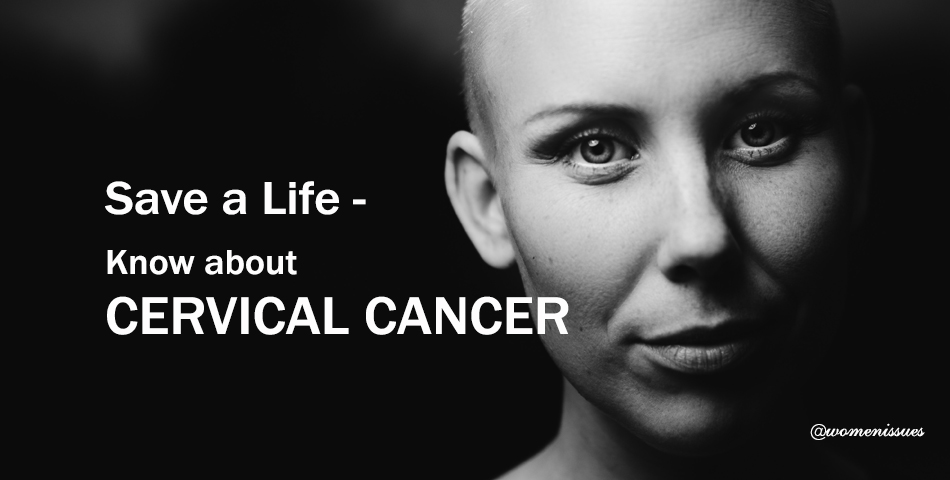What is cervical cancer?
Cancer cells can grow on any part of the body and when these cells grow on the cervix, it is then referred to as the cancer of the cervix better known as cervical cancer.
What causes cervical cancer?
Firstly it is important to understand that unlike other cancers cervical cancer is not hereditary or contagious. A virus called the human papillomavirus (HPV) is strongly linked to cervical cancer. HPV can be passed on from one person to the other through sexual activity and both men and women can be infected. This virus causes the normal cells of the cervix to turn abnormal. The virus is found in over 90% of cervical cancer patients. Abnormal cells are sometimes called “pre-cancer” because if they are not found and treated they can turn into cancer. The human papillomavirus (HPV) has more than 150 subtypes that can cause cervical, penis, anus, vaginal and vulvar cancers.
Save a Life – Know about CERVICAL CANCER
What are the Signs and symptoms?
Cervical cancer grows slowly and these abnormal cells rarely cause symptoms. Often symptoms are not caused until it is advanced. But there are abnormalities to look out for and to take into serious consideration although they are not early warning signs and they are:
- abnormal or continuous bleeding
- experiencing abnormal pain during sexual intercourse
- persistent lower abdominal pain
- bleeding after sexual intercourse
- persistent and abnormal vaginal discharge
- Vaginal bleeding after menopause
- painful urination
- urinary incontinence
- anemia
What are the risk factors?
- Smoking – women who smoke are twice likely to get it because smoking weakens the immune system
- Obesity
- Long-term use of oral contraceptives
- Engaging in early sexual contact
- Many sexual partners
Can cervical cancer be prevented?
The best way to prevent it is to find and treat the abnormal cells. We always preach how prevention is better than cure, there are certain steps that can be taken to be on the safer side. Women who have had kids or those who are sexually active are especially advised to visit a gynaecologist to do a pre-cancer Pap smear at least once every 2 years. Pap smear will help in detecting any abnormal “pre-cancer” cells before they turn cancerous. There is a vaccination available for HPV and in 2014 the vaccination against the human papilloma virus became part of the South African national vaccination programme. Preteens aged from 9-12 years both girls and boys can be vaccinated until the age of 45 in women and 26 in men. The vaccine will help the immune system to create the antibody response to protect the body from the infection. Most cervical cancer cases can be preventable and curable if tests are done.
N.B Do not stop the regular Pap smear even after being vaccinated against HPV. Your gynae or GP will advise you on how often to do the screening when you are vaccinated. Regular Pap smear can save your life.
What are the treatment methods of cervical cancer?
- Surgery – in the early stage it is often performed to remove cancer or hysterectomy (removal of the uterus) can be performed. Other procedures can be performed and depending on how advanced it is
- Radiation therapy – often combined with chemotherapy if it is given as the main treatment and may cause diarrhea, fatigue, nausea, vomiting, early menopause
- Chemotherapy – can be recommended together with radiation therapy and side effects include nausea, vomiting, fatigue, hair loss and mouth sores. If cancer comes back after treatment it can be used as a treatment of choice
- Targeted therapy – sometimes used for advanced cervical cancer and the drug is specifically developed to interrupt cellular processes that promote cancer cells growth
Scary facts about cervical cancer
To mention a few that will hopefully push women to do right by themselves
- up to 80% of sexually active women will acquire HPV in their lifetime
- worldwide every 2 minutes a woman dies of cervical cancer
- fewer women in South Africa go for Pap smear because they are scared of the process putting them at higher risk
- HPV is a common STI and men act as carriers (HPV in men can cause genital cancers or other health problems)
- Silent killer with late warning signs
“What a culture we live in, we are swimming in an ocean of information, and drowning in ignorance.” ― Richard Paul Evans, A Step of Faith


No Comment